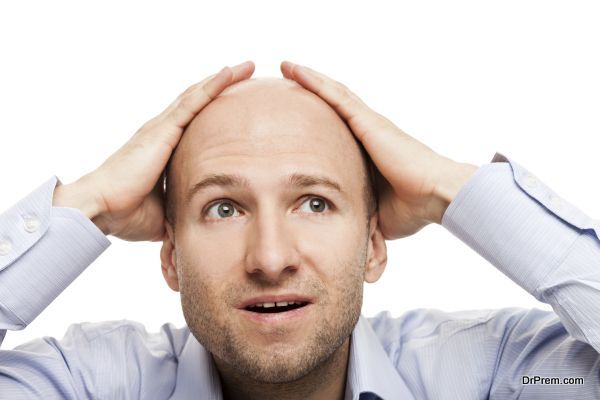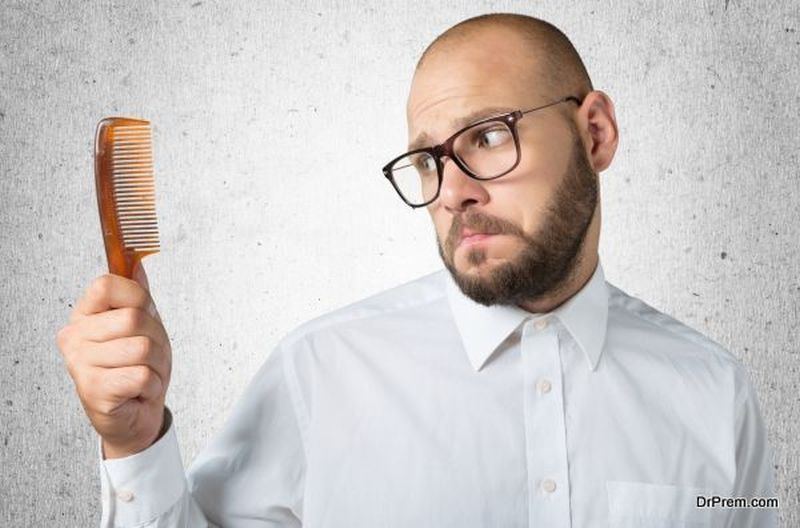Hair loss doesn’t discriminate – it can and does affect both men and women across the country. In fact, two-thirds of American men suffer from hair loss, or male pattern baldness (MPB), whereas 21 million American women are actively combating alopecia.
So what exactly causes these conditions and what treatment options are available? Read on to find out!
Male Pattern Baldness vs. Alopecia

Before we explore the external factors that can cause hair loss, let’s quickly discuss the common, medical diagnosis of hair loss in both men and women. Though they are coined with different names, there isn’t much difference between male pattern baldness and alopecia.
MPB is caused by a change in a man’s hormone levels and primarily results in hair loss on the scalp. Other factors that can cause male pattern baldness are genetics and age. So why exactly does it happen? When a man ages and his hormone levels change, tiny cavities in the skin and scalp begin to shrink. This shrinkage occurs near the hair follicles, causing hair to grow shorter, more thin, or not at all. Genetics play a role as well, meaning men with first and second generation relatives who suffered from MPB are more likely to experience hair loss themselves.
But what about women? Alopecia is often used to describe hair loss or thinning in the female sex. One interesting fact about female hair loss is that this condition is actually due in part to a variation of the male hormone, testosterone. A hormone known as dihydrotesterone (DHT) in women causes the same type of hair follicle shrinkage as seen in men. The difference is that it expresses itself in an overall thinning of a woman’s hair, over her entire scalp, known as diffuse thinning. MPB usually causes hair loss in specific areas and patches.
But what if you’re not experiencing hair loss due to these specific, medical conditions? Can other factors cause short term hair loss? Let’s take a look.
Anemia
Anemia is an iron deficiency that affects an estimated 3.4 million Americans. Low iron levels impact a person’s red blood cells, resulting in low levels of hemoglobin, a protein that carries oxygen from the lungs to the rest of the body. Anemia can also be a result of excessive bleeding, occurring during a woman’s menstrual cycle, ulcers, and certain forms of cancer.
So how does anemia cause hair loss? When you body feels as if it’s oxygen levels are depleted, it goes into survival mode. This means that your body instinctively uses any available oxygen to help your main organs function. With little to no oxygen focused on your hair follicles, your hair will begin to fall out. Hair loss caused by anemia can often be corrected using an iron supplement.
Stress

When stress rears its ugly head, it can cause a host of medical issues and ailments. Extended periods of stress can negatively impact your immune system, and eventually lead to a compromised medical state. Hair loss, in both men and women, can be attributed to stress – both physical and emotional.
Physical stress is when you experience some sort of trauma. This could be a traumatic event like being in a car accident, severe illness, or recent surgery. These stress factors can trigger hair loss known as telogen effluvium that affects your hair’s normal growth cycle, which looks something like this:
- Growth phase
- Rest phase
- Shedding phase
During telogen effluvium, this growth pattern is shocked and interrupted. This interruption causes more hair to enter the shedding phase, usually between 3 and 6 months following the event. The good news is that once your body recovers, your hair should return to its normal growth process.
Emotional stress can be both physically and mentally taxing. A surprising fact about emotional stress and hair loss is that the stress itself is not what causes hair loss, but instead triggers a pre-existing condition that results in hair loss. Emotional events could include a death in the family, divorce, or extreme financial troubles, just to name a few. The only way to combat this type of hair loss is to practice stress reducing exercises, such as yoga or meditation. Exercise and talking to a therapist might also help ease your stress and in turn, prevent future hair loss.
Vitamin Deficiency
Doctors are always telling us to take our daily vitamins. And why? Because the human body needs a certain level of each vitamin to properly function. Without certain vitamins, you may experience hair loss.
Vitamin B levels are connected to your iron levels – B12 specifically. Vitamin B deficiency in women may become more prevalent during menopause. Vitamin A is actually found in many hair loss treatment medications. This is because vitamin A promotes hair growth in the body. Low levels of vitamin A can have the adverse effect. But be cautious when taking vitamin A supplements – an overabundance of this vitamin can actually cause hair loss, too!
Thyroid Issues

Your thyroid is a gland found in your neck that is responsible for producing and storing hormones that impact the overall functionality of your body. The most common physical effects of thyroid issues are weight loss or gain and the fluctuation of a person’s energy level. But an underactive thyroid can also lead to hair loss.
Because your thyroid releases and controls hormones in your body, if it’s not working properly, hair growth is negatively affected. As with traumatic physical stress, any alteration in the thyroid’s functionality will interrupt the hair growth process, forcing too many hair follicles to rest at any given time, resulting in thinning hair or even balding. Thyroid medications and a visit to your doctor’s office can usually help rectify this issue and help regulate your thyroid.
Treatment
Most of these hair loss conditions can easily be treated by a visit to your doctor and an assessment of the cause. Those causes associated with stress and/or nutrition deficiencies can usually be rectified through the use of medications and changes in your external atmosphere.
For hair loss attributed to more serious medical conditions, there are countless hair restoration options available.
Stay Calm

One of the most important factors when it comes to dealing with hair loss is to remain calm and not become overly worried or stressed over the situation. As we know, stress in itself can cause hair loss. Also, know that you are not alone! Hair loss is an extremely common condition among millions of Americans. Start by evaluating your current medical and mental state – this will help you to diagnose the cause of the issue.
Article Submitted By Community Writer




